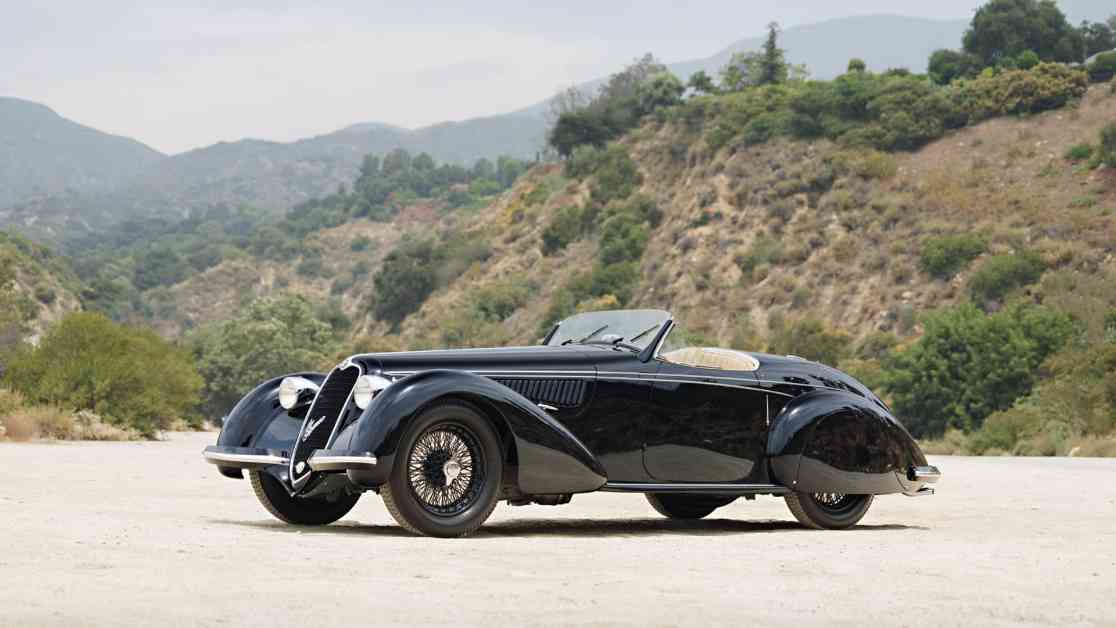Classic Car Sales Decline in Monterey Auctions as New Generation Emerges
The classic car market is experiencing a significant shift as a new generation of collectors emerges, leading to a decline in sales at the prestigious Monterey Car Week auctions. Traditionally dominated by baby boomers who favored classic cars from the 1950s and 1960s, the market is now seeing a surge in interest from Gen Xers and millennials who prefer vehicles from the 1980s, 1990s, and 2000s.
According to data from Hagerty, total sales at this year’s five car auctioneers in Monterey fell to $391.6 million from $403 million in 2023, marking a 3% decline. This follows a 14% drop last year compared to the peak of 2022. Of the 1,143 cars up for sale, only 821 were sold, resulting in a 72% sell-through rate. The average sale price also saw a slight decrease, dropping to $476,965 from last year’s $477,866.
Simon Kidston, the founder of Kidston and a prominent advisor to wealthy car collectors, attributes the decline in sales to market saturation. He noted that there were too many similar cars at multiple auctions, leading to competition for the same buyers. Many of these classic cars had already been on the market for extended periods, contributing to a lack of interest and low sales.
The changing preferences of collectors are evident in the sell-through rates for different car categories. Pre-1981 cars priced at $1 million or more had a sell-through rate of only 52%, while cars less than 4 years old saw a much stronger 73% sell-through rate. This disparity highlights the growing influence of younger collectors in the classic car market.
Hagerty’s Supercar Index, which tracks sports cars from the 1980s through the 2000s, has seen a significant increase of over 60% since 2019. In contrast, the Blue Chip Index, which focuses on 1950s and 1960s classics like Corvettes, Ferraris, and Jaguars, has experienced a 3% decline. This trend reflects the shifting preferences towards more modern vehicles among collectors.
While the overall market for classic cars may be experiencing a slowdown, rare and exceptional masterpieces still command high prices. The top-selling car at Monterey Car Week was a 1960 Ferrari 250 GT SWB California Spider that fetched $17 million at RM Sotheby’s. Following closely was a 1938 Alfa Romeo 8C 2900B Lungo Spider, one of only five in existence, which sold for $14.03 million at Gooding & Company.
McKeel Hagerty, CEO of Hagerty, acknowledges the market’s transition from older classics to modern supercars. He notes that the divergence between the two categories has accelerated, signaling a broader shift in collector preferences. The rise of interest rates is also impacting the classic car market, with buyers considering alternative investment opportunities that offer higher returns.
Despite the challenges facing the classic car market, there is still a demand for exceptional vehicles. The allure of owning a piece of automotive history continues to attract collectors, albeit with a shift towards more modern and rare models. As the market adapts to the changing landscape, it is likely that prices for older classic cars will face downward pressure in the coming years.
Top 10 Most Expensive Cars Sold During Monterey Car Week
1. 1960 Ferrari 250 GT SWB California Spider – $17,055,000 (RM Sotheby’s)
2. 1938 Alfa Romeo 8C 2900B Lungo Spider – $14,030,000 (Gooding & Company)
3. 1955 Ferrari 410 Sport Spider – $12,985,000 (RM Sotheby’s)
4. 1969 Ford GT40 Lightweight – $7,865,000 (Mecum)
5. 1997 Porsche 911 GT1 Rennversion Coupe – $7,045,000 (Broad Arrow Auctions)
6. 1959 Ferrari 250 GT LWB California Spider – $5,615,000 (RM Sotheby’s)
7. 1995 Ferrari F50 Coupe – $5,505,000 (RM Sotheby’s)
8. 1955 Ferrari 857 S Spider – $5,350,000 (Gooding & Company)
9. 1967 Ferrari 275 GTB/4 Alloy Coupe – $5,285,000 (RM Sotheby’s)
10. 1958 Ferrari 250 GT TdF Coupe – $5,200,000 (Gooding & Company)
In conclusion, the classic car market is undergoing a transformation driven by changing collector preferences and market dynamics. While sales at Monterey Car Week have declined, there is still a strong demand for exceptional vehicles, especially among younger collectors. As the industry adapts to these shifts, the future of classic car sales remains intriguing and dynamic.






















